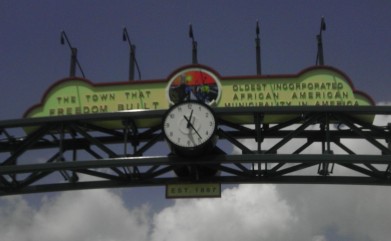|
Eatonville, FL and Princeville, NC Both Claim Title of 'Oldest Incorporated African-American Town'  Sept 20, 2012 | WMFE - Residents in the town of Eatonville are celebrating its 125th anniversary this year. It was incorporated in 1887. A sign on the town's new commemorative archway unveiled last month says Eatonville is the "oldest incorporated African-American municipality in America." But another town makes the same claim. That town is Princeville, North Carolina, which was incorporated in 1885. Both towns could benefit from the prestige and potential tourism revenue that may accompany nationwide recognition as the oldest incorporated African-American town in the US. So, which is the oldest? The answer is not so simple. [Image: Eatonville's new archway stretches across the town's main street, Kennedy Boulevard. The sign atop it welcomes visitors to Eatonville on one side. On the other side (pictured), it reads in part, "Oldest Incorporated African American Municipality in America"] Judging by the numbers alone, it seems clear that Princeville, not Eatonville, is the oldest existing incorporated African-American town in the US. Princeville historian Ruldolph Knight heads a private preservation group in neighboring Tarboro, North Carolina promoting awareness of African-American history and culture. “Hands down, I don't see how Eatonville can make that claim…chronologically, Princeville was incorporated on February 20th 1885, and Eatonville was in 1887,” he says. According to Knight, Princeville began as a camp for Union soldiers sent to protect newly-freed slaves after the Emancipation Proclamation and the end of the Civil War. African-Americans settled nearby for the relative safety, and a town began to form. In Florida, Eatonville took shape under very different circumstances. N.Y. Nathiri of the Association to Preserve the Eatonville Community says a widespread culture of violence against African-Americans in the 1860’s changed the way blacks approached living in the south. “There were certain thinkers in the African-American community that said, ‘If we cannot live safely with whites, we need to form communities or settlements where at least we can look at being physically safe,’” explains Nathiri. So, the founders of Eatonville set out with the intention of forming an all-black town. “Joe Clark actually bought the land and then provided it in parcels, small parcels,” Nathiri says. “At the time, the newspaper the Eatonville Speaker advertised, ‘Solve the race problem – come to Eatonville and govern yourselves. There's not a white family in the town.’” It's that deliberate – and successful – planning that Nathiri says makes Eatonville the true first African-American incorporated town. In contrast, Princeville formed organically, and attracted some white and Native American residents. But Princeville's Rudolph Knight still contends the year of incorporation is what matters. “Look at the documents. Look at the facts. You can’t go back and change it,” maintains Knight. “But when people have a project or they have a goal in mind, they can start to sort of manipulate and change to fit what they want it to fit.” Everett Fly, author of the book “Black Settlements in America,” says both of the towns were part of something big – Princeville was first chronologically, Eatonville was first to be a planned black community, and Fly says both firsts are important. “The fact that Eatonville and Princeville were established within two years of each other in different states makes it very clear that there was kind of a movement across the country for African-Americans to claim their civil rights through establishment of incorporated municipalities,” explains Fly. At the time, owning land was the key to rights such as education, voting and running for public office. Princeville does have time on its side, says Fly. However, he adds, details including Eatonville’s planned layout and the mix of people it attracted cannot be ignored in the debate. Residents challenged cultural norms for the time by moving great distances to come to Eatonville. “Most of those folks that settled Eatonville were from Virginia or Alabama or Tennessee or other parts of Florida,” Fly says. “So, these were folks that were very industrious, they were willing to move and relocate.” Among those attracted to Eatonville were the family members of renowned author, folklorist and anthropologist Zora Neale Hurston. She grew up in Eatonville and described it vividly in her books. N.Y. Nathiri says Hurston’s works raised the town’s profile as a significant location for black history and culture. “We need to be very careful that we understand the authenticity upon which Eatonville rests. We don't have to do any kind of somersaults or backflips, we don't have to do any twisting and turning. We are authentic.” The National Registry of Historic Places recognizes the contributions of both Eatonville and Princeville. Both towns would like to develop cultural tourism partially tied to designation as the nation's oldest incorporated African-American municipality, but which town holds that title still seems to be a topic of debate. |
|